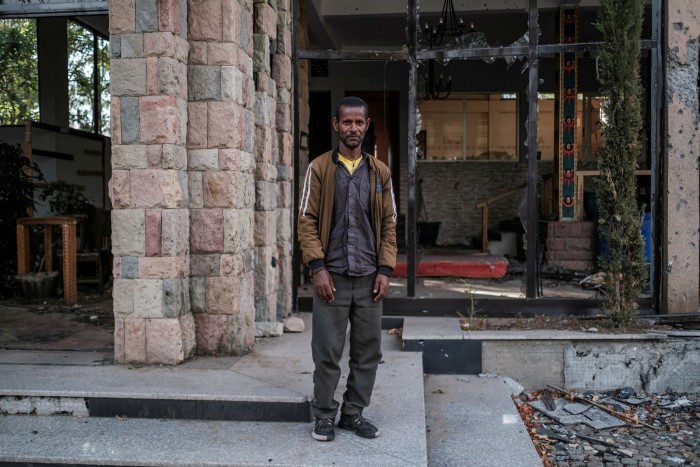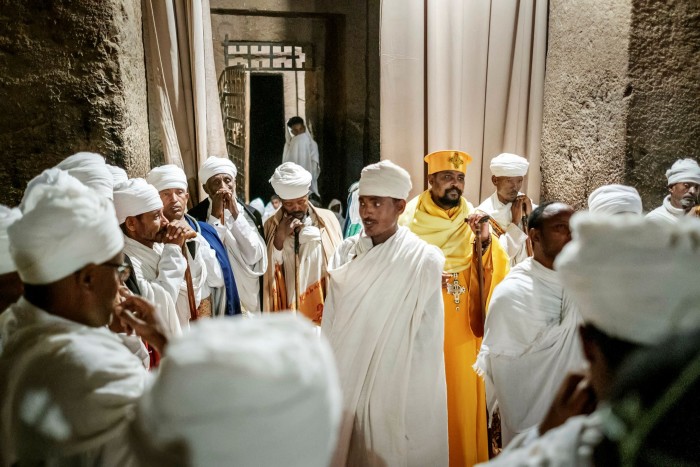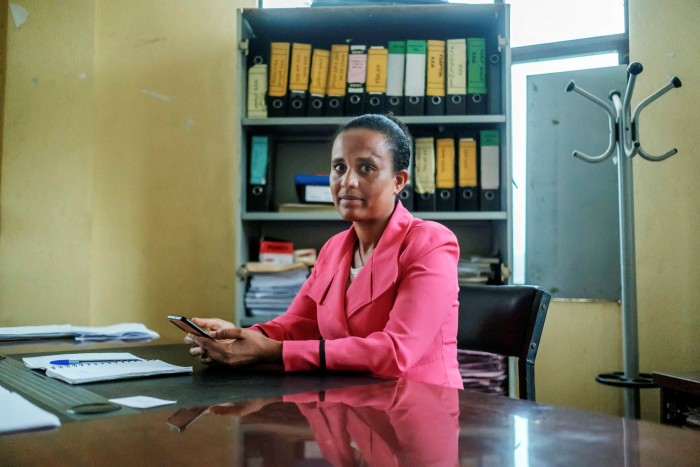Ethiopia atrocities cast long shadow as city of Lalibela prays for peace

Roula Khalaf, Editor of the FT, selects her favourite stories in this weekly newsletter.
Shrapnel scars the walls of a hotel in central Lalibela, the storied Ethiopian city that was the heart of a months-long battle between Tigrayan fighters and the federal government.
The walls of the Cliff Edge Hotel bear witness to the presence of the Tigrayans who captured the city, a Unesco world heritage site. They scrawled slogans such as “welcome to the state of Tigray” and “Tigray wins”.
“They were really bad to us,” said Deribo Fikade, the hotel security guard referring to the rapes, beatings and executions allegedly carried out by troopers loyal to the Tigrayan People’s Liberation Front. Many TPLF fighters were killed in government drone strikes. The rest returned to their northern home. “After this, I don’t think they will return here, hopefully, we’ll have peace soon.”
The fight over Lalibela, famous for its rock-hewn churches, was the climax of a more than year-long war. Some 600km from Addis Ababa in the Amhara region, its capture brought with it the risk that the Tigrayan fighters, who had previously led a coalition government for almost three decades, might march on the capital.
“Controlling Lalibela was a big victory for them [the Tigrayan forces] because it is one of the most prominent places in the country, and they considered controlling Lalibela an embarrassment for the government of Ethiopia,” said Fr Tsige Mezgebu, the local administrator of the Ethiopian Orthodox Church. He remembers the fighters’ arrival by the sound of screams on the streets and his fear that they would destroy the 12th century holy site for Orthodox Christians.


Now, as the city picks up the pieces, many are hopeful for a settlement to a conflict that endangered the unity of what had been an African economic powerhouse.
The war saw thousands of people killed on both sides and sullied western support for prime minister and Nobel Peace Prize winner Abiy Ahmed, who sent troops north to crush the TPLF after, he said, their fighters had attacked a key garrison in Tigray’s capital, Mekelle.
The conflict, which began in November 2020 and spilled over into the Amhara and Afar regions last year, has now eased. “There is no active fighting,” Kindeya Gebrehiwot, a spokesman for the TPLF, told the Financial Times.

There have been several steps along the way.
In January, Addis Ababa released opposition leaders from prison and signalled its willingness to talk to its opponents. In late March, it declared a “unilateral truce” to allow food aid to get through to the blockaded northern region. Although UN trucks have so far only reached a small fraction of the 4.8mn people in need of food, these were the first deliveries allowed in since December.
“These were not just tokens, but politically tangible measures the federal government took to try to resolve the conflict politically,” said a senior government official in Addis Ababa. In late April, Tigrayan forces announced that they had fully withdrawn from the Afar region. Backchannel talks between military officials from Addis Ababa and Mekelle are said to be taking place.
According to the TPLF’s Kindeya, the “cessation of hostilities . . . needs to be followed up with a negotiated comprehensive ceasefire, Amhara and Eritrea forces need to withdraw from all territories of Tigray”. During what he called “a meaningful negotiation”, he said “both parties will table their demands”.


“A strategic decision has been made by both sides to shift from the military to the political approach,” said Tekeda Alemu, a former diplomat and senior member of an initiative for a national dialogue in Ethiopia.
The TPLF “seems to have realised that it has miscalculated”, said Alemayehu Weldemariam, a Tigrayan political analyst and academic. It “overestimated its military power while underestimating the capabilities of its enemies. It seems to have realised that Tigray has been rendered unviable for independence. Its economy reduced to ashes, its money taken out of circulation, communications blacked out, and besieged by enemies.”
If negotiations happen, analysts and officials say, they may have to start with the government removing its designation of the TPLF as a terrorist organisation. Bones of contention include the withdrawal of Eritrean and Amhara forces from Tigray, and the resolution of a long-running land dispute between Amhara and Tigray. Other obstacles to peace are Tigray’s large standing army and the investigation of atrocities allegedly committed by all sides.
These brutal acts still resonate across the country and would probably overshadow any talks. Although activists, human rights organisations and analysts say that Tigrayans may have borne the brunt of the war, residents of Lalibela and surrounding villages also have reason to grieve.
Melkamu Bekele, a 32-year-old hotel receptionist begged for mercy from Tigrayan fighters, Bogale Teshome, his brother said.
“While the fighting was going on the TPLF forces found him on the street with his friends and beat them all with sticks, saying, ‘why are you enjoying it here on the street while our comrades are dying in the fighting?’ When he tried to rise up, they shot him in the head even if he was begging them in the name of the Virgin Mary not to shoot him,” said Bogale.
Tesfa Habtie, the newly installed mayor of Lalibela, said: “The community endured huge pressures. They beat the young, they raped women, they looted properties. There were killings as well.”

At a grave in Gashena, some 60km from Lalibela, Abiy Solomon, a construction worker, recalled his brother’s killing, allegedly by Tigrayan fighters.
“They killed my brother while he was sitting with friends in the house. They entered, told them, ‘you gathered together here to fight against us’, and killed them,” he said, adding that Tigrayan fighters killed 57 civilians in total in Gashena between August and December 2021.
These atrocities could hinder a lasting settlement. “Prospects for real peace are dim in the short run, given that emotions are running high as a result of the unspeakable crimes of mass atrocities committed in the course of the war by all parties involved,” said Alemayehu. A return to war “is something we cannot yet rule out”, Alemu added.
Asked about atrocities committed by Tigrayan fighters, Kindeya said they were not equivalent to those carried out by other forces against Tigrayans and said there should be an independent investigation.
Back in Lalibela, Adissu Wolde, a young Ethiopian Orthodox priest wearing a white gabi shawl, has devoted himself to praying for peace during Eastern night at Biete Medhane Alem rock-hewn church: “We need peace, it is about time.”
Comments